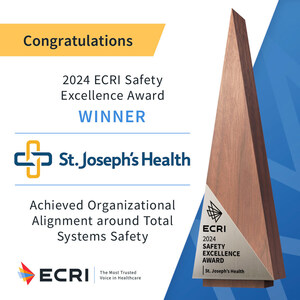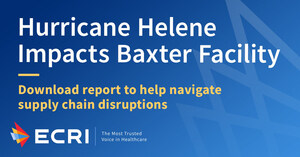PLYMOUTH MEETING, Pa., Oct. 21, 2020 /PRNewswire/ -- U.S. health authorities must approve COVID-19 vaccines only after reviewing six-months of trial data, the nation's largest patient safety organization will tell U.S. Food and Drug Administration (FDA) advisors on Thursday. Anything short of that poses significant safety risk to the American public, says ECRI, a respected nonprofit organization that conducts independent evaluations to inform the healthcare sector.
"Vaccines are some of the safest and most effective ways to protect the American public from disease, but rushed deadlines and incomplete data pose significant safety risks," says ECRI President and Chief Executive Officer Marcus Schabacker, MD, PhD. "A complete review of trial data is critical for understanding the risks and benefits of COVID-19 vaccines."
In May 2020, the U.S. government launched Operation Warp Speed (OWS), a public-private partnership intended to develop nine vaccine candidates, with the stated goal of starting distribution by January 2021. Its strategy includes streamlining the vaccine approval process while maintaining appropriate safety and effectiveness controls. ECRI warns that pressure to authorize an early release of a novel coronavirus vaccine without the robust data outlined by OWS could result in significant harm to Americans.
Regulatory action based on preliminary trial data is a poor, non-evidence-based practice that exposes the public to danger, Schabacker says. The topic will be discussed Oct. 22 at the FDA Vaccines and Related Biological Products Advisory Committee, (Docket No. FDA-2020-N-1898). Schabacker will present ECRI's position during the public comment period:
- Review of completed clinical trials is necessary to ensure COVID-19 safety and effectiveness
- COVID-19 vaccine candidates entail old and new risks
- Lack of effectiveness poses a substantial risk of harm
- Uncertainty is inherent to vaccine testing, more so during a pandemic
- Preliminary data are unreliable even in clinical trials
- Regulatory action based on preliminary trial data makes for poor evidence-based practice
"Complete clinical trial information and careful consideration of the limitations of available data are essential to ensuring the safety and effectiveness of a COVID-19 vaccine," Schabacker says. "The risks and consequences of a rushed vaccine could be very severe if the review is anything shy of thorough."
ECRI's full position statement, Fast-tracking COVID-19 Vaccine Approval: Rushing to the Finish Line May Result in Tripping and Falling, is available in ECRI's COVID-19 Resource Center at www.ecri.org. For other questions, contact ECRI at (610) 825-6000 or by e-mail at [email protected].
Social Sharing
.@ECRI_Org warns fast-tracking #Covid-19 #vaccines puts people in America at significant risk; advises FDA to wait for complete trial data
About ECRI
ECRI is an independent, nonprofit organization improving the safety, quality, and cost-effectiveness of care across all healthcare settings. With a focus on patient safety, evidence-based medicine, and health technology decision solutions, ECRI is respected and trusted by healthcare leaders and agencies worldwide. Over the past fifty years, ECRI has built its reputation on integrity and disciplined rigor, with an unwavering commitment to independence and strict conflict-of-interest rules.
ECRI is the only organization worldwide to conduct independent medical device evaluations, with labs located in North America and Asia Pacific. ECRI is designated an Evidence-based Practice Center by the U.S. Agency for Healthcare Research and Quality. ECRI and the Institute for Safe Medication Practices PSO is a federally certified Patient Safety Organization as designated by the U.S. Department of Health and Human Services. The Institute for Safe Medication Practices (ISMP) formally became an ECRI Affiliate in 2020.
Visit www.ecri.org and follow @ECRI_Org
SOURCE ECRI

Related Links
WANT YOUR COMPANY'S NEWS FEATURED ON PRNEWSWIRE.COM?
Newsrooms &
Influencers
Digital Media
Outlets
Journalists
Opted In






Share this article